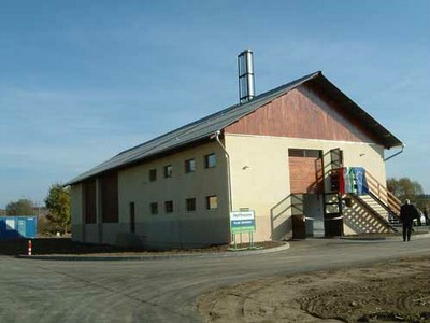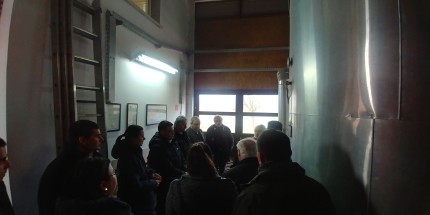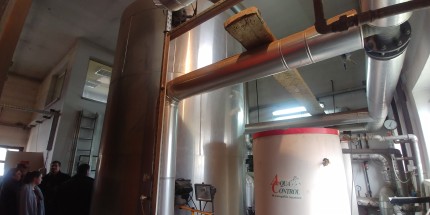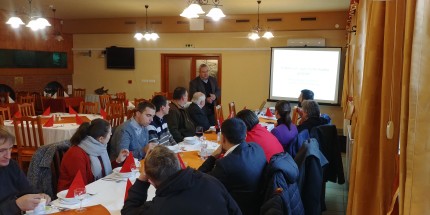Local Support Group meeting in Hungary
The third Local Support Group meeting of the RURES project was carried out by the West Pannon Regional and Economic Development Non-profit Ltd. organized on 13 December 2018 in Pornóapáti, Hungary. In addition to the representatives of municipalities that are responsive to energy efficiency and renewable energy, teachers and students from universities also attended the event.
The goal of the event was to present the results of the RURES project. Tibor Polgár, like West Pannon Nonprofit Ltd. Strategic Director welcomed the participants, summarized briefly what activities the project involves, what can be utilized for the project by a local government and what tasks have been completed so far and what are the next steps within the project. He introduced the completed Slovenian pilot investment as well as other planned investments. He said that the Hungarian version of the Best Practice Handbook will be ready early next year from which local governments can learn a lot can get to know a lot of examples. In addition, the calculator to be planned is also discussed. The participants told what they would like to see in such a calculator.

Following the demonstration of the RURES project, the biomass heating plant was presented. Pornóapáti is a small village on the western border of Hungary. After many attempts in Hungary, the first biomass fired village heating plant was realized here in the autumn of 2005. The heating system based on the basically Austria model is able to fully supply the heating and domestic hot water supply, which means that the village can produce these energies from its own area. The heating plant is located in the center of the village on an unbuilt plot owned by the local government. The building consists of two larger rooms. In one there are two 600 kW boilers which are each other's reserves. Boilers can produce maximum 95°C water. The boilers also have a 10 m3 heat storage tank. In the other room, wood chips are stored with a total capacity of 400+120 m3. There is also a boiler feed transporter that is hydraulically driven and pushes the fuel into the combustion plant. The fuel can only be bio wood chips and sawdust, which cannot contain chemicals. The hot water reaches homes and institutions through insulated district heat pipes. The system basically runs a whole year, except for a 2-week maintenance period in the summer, providing hot water only in summer. The system is fully automatic, remote monitoring.
Main data of the built-in system:
• Total heat demand: 1150 kW,
• Fuel consumption: 1220 t / year
• Annual heat loss: 8215 GJ
75-78 percent of households demanded this type of heating in the village at present.


Following the presentation of the biomass heating plant, the meeting continued in Vaskeresztes where the mayor of Erdőhorváti (East-Hungary ) presented their good practice. The topic presented by the mayor is the utilization of agricultural and forestry by-products at the municipality of Erdőhorváti. The village of Erdőhorváti is located in the north-eastern part of the country. It is one of the most underdeveloped parts of Hungary where public employment is useful and they are also using this opportunity. They’re using wood chips for heating public institutions (school, municipal building, nursing home) so the million HUF heating cost now stands at circa HUF 500 000 (1.600 EUR) in the winter season. By doing so, they create jobs for people living there and they are heating up public institutions in a sustainable way.
Woodchips and pellets produced by so-called public workers whose employment is covered by the national state budget. 72% of the local population is unemployed and mostly unskilled. The mayor organized agricultural production and the processing of by-products from this budegtary resources provided for the wage of “public workers” as well as from LEADER funds. Agricultural goods and pellets produced are now sold on the regional market with the help of several retailers there. Incomes are reinvested into community infrastructures by the municipality– resting places, playgrounds, etc. and used for own resources in projects funded through applications.
Questions were raised and discussion started after the presentation since cheap and good quality heating material is scarce in West Hungary so the Erdőhorváti example of utilizing agricultural by products is valuable and lends itself for adaptation.
